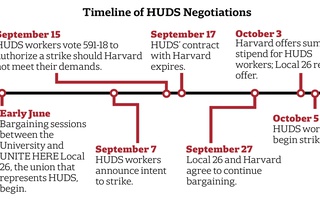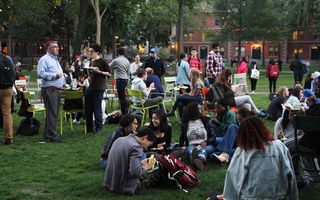
Preparing for the strike by HUDS workers, supporters supplied large recreational vans on Garden Street with equipment, including signs, ponchos, and megaphones.
UPDATED: Oct. 4, 2016, at 8:20 p.m.
Harvard’s dining hall workers will report to picket lines Wednesday morning instead of the dining halls as their union initiates a much-anticipated strike after failing to reach a contract agreement with the University.
This is the first time Harvard’s dining hall workers will walk off the job during the academic school year in the union’s history of bargaining with the University, according to Brian Lang, the president of UNITE HERE Local 26—the Boston-based union that represents the dining workers.{shortcode-0575787915d7abdd159f54541f23d40739ee68f1}
The strike will go into effect 6 a.m. Wednesday and last indefinitely. In an email sent to undergraduates earlier Tuesday, Dean of Students Katherine G. O’Dair, wrote that three upperclassmen dining halls—Kirkland, Dunster and Cabot—will be closed starting on Wednesday for the duration of the strike, though the remaining dining halls will have extended hours.
Additionally, Fly-By—an alternative dining option for upperclassmen—will continue to run and be expanded to include freshmen. Students will not be able to order take out options.
Harvard and its dining service workers have been negotiating, to no avail, for nearly four months in a tense back-and-forth. Both sides met for their 19th bargaining session Tuesday in an effort to hammer out a new contract before a midnight deadline.
Last week, Local 26 announced that they would wait until midnight on Tuesday to announce a strike, but according to Local 26 spokesperson Tiffany Ten Eyck, the union thought it was “clear” around 5:30 p.m. Tuesday that they would not reach an agreement with the University before that deadline.
According to University spokesperson Tania deLuzuriaga, Harvard’s bargaining team offered to continue bargaining until the 11:59 p.m. deadline, but said the union left the session at 5:30 p.m. When asked whether the union intended to continue bargaining past the time it released its announcement, Ten Eyck declined to comment.
The union has asked Harvard to increase HUDS workers salaries to $35,000 a year and to guarantee summer employment to interested workers; HUDS employees generally do not work during school recesses. Harvard has offered to increase HUDS workers wages 10 percent over the course of five years, and on Monday offered a summer stipend that would provide HUDS workers who were available to work during the summer anywhere from $150 to $250 per week, “even if there are no open shifts.” The amount of the stipend would depend on the worker’s tenure at Harvard.
Data from the Bureau of Labor Statistics, a federal organization that aggregates labor data based on profession, from May 2015 indicates that the annual mean wage for food preparation and serving-related occupations in the Boston area was $27,690.
Health benefits have also proved a contentious issue at the bargaining table. Harvard has offered a plan offered to other campus unions—which would eliminate deductibles but increase copayments. In a bargaining session Monday, and with the strike deadline looming, Harvard proposed a series of “enhanced” health care options and wage supplements.
Harvard also extended two healthcare options to the union. The first would create a premium contribution tier for workers earning $55,000 or less annually in which Harvard would contribute 87 percent of the premium of the lowest-cost plan. In addition, Harvard would fund a “flexible savings account” of $80 per year in 2018 and 2019, and $40 in 2020.
These proposed changes would not be implemented until 2018.
In the second health care option, Harvard would contribute the “equivalent cost of the Harvard University Group Health Plan enrollment premium” to a health insurance plan offered by Local 26.
Local 26 has rejected all offers.
When asked what the union has proposed at the bargaining table, Local 26 representatives declined to offer specifics other than that they do not want dining workers to have to pay more money in out-of-pocket health costs.
Dining halls in upperclassman Houses and Annenberg switched their metal utensils with plastic forks, knives and spoons earlier in the day Tuesday. By lunch, most of them had replaced their dishes with plastic plates and bowls.
HUDS spokesperson Crista Martin did not respond to a request for comment about why the University had swapped in plastic utensils.
—Staff writer Brandon J. Dixon can be reached at brandon.dixon@thecrimson.com. Follow him on Twitter @BrandonJoDixon.
Read more in University News
Harvard to Issue $2.5 Billion in BondsRecommended Articles
-
 Students Advocate for HUDS in Harvard Yard, Law School
Students Advocate for HUDS in Harvard Yard, Law School -
 Harvard—and Dining Workers Union—Prepare for Day One of Strike
Harvard—and Dining Workers Union—Prepare for Day One of Strike -
During Strike, Harvard Finds Alternate WorkersAbout 70 HUDS managers, 15 temporary hires, and 15 Harvard employees worked in the dining halls to serve meals throughout the day, a fifth of Harvard's usual labor supply.
-
 No Agreement Reached in Latest Dining Workers Bargaining Session
No Agreement Reached in Latest Dining Workers Bargaining Session -
Strike Ends After Dining Employees Vote in Favor of ContractA 22-day dining services’ worker strike officially ended Wednesday after employees voted overwhelmingly to approve a new contract with Harvard, capping off months of tense negotiations with the University.













